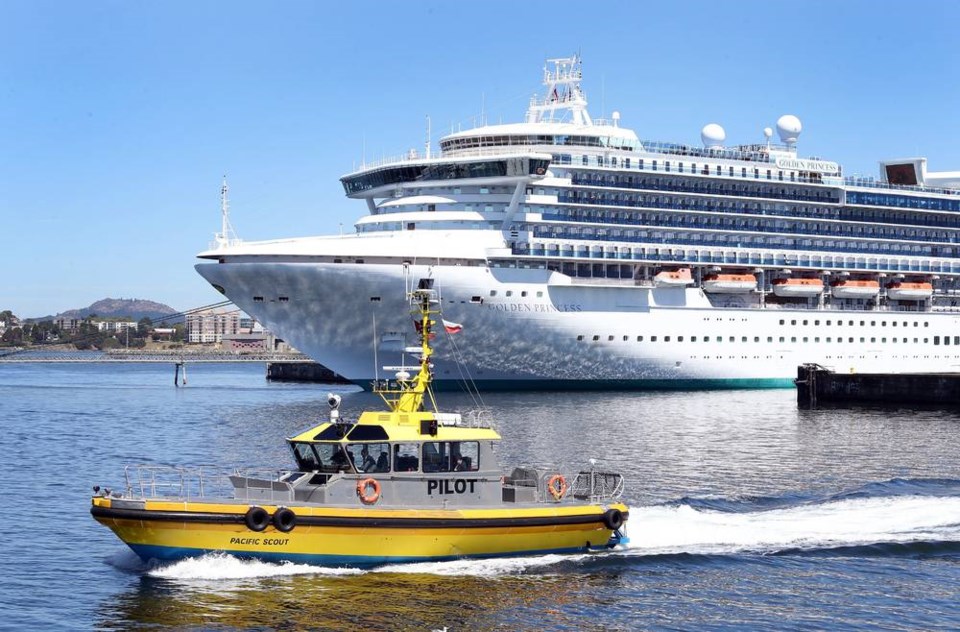The U.S. House of Representatives approved legislation Thursday that would allow cruise ships out of Washington state heading to Alaska this year to skip their usual stops in Victoria and Vancouver.
Now it’s up to U.S. President Joe Biden to sign the bill into law.
Victoria’s Ogden Point normally sees more than 200 cruise ship visits every year, delivering passengers and crew into the city’s downtown and to major attractions. But the pandemic has closed borders and Canada has announced a ban on large-cruise-ship visits until next year, meaning tourism-oriented businesses will lose two years of the normally lucrative cruise market.
U.S. legislation requires foreign-registered cruise ships sailing between American ports to stop in Canada, but the new bill will temporarily remove that requirement, allowing cruise lines to offer sailings out of Washington state straight to Alaska, which depends on business from the huge ships.
“COVID-19 has devastated Alaska’s tourism industry,” Alaska Senator Lisa Murkowski said in a statement after the vote. “After missing the 2020 season due to COVID-19 travel restrictions, Alaskans across the state have been feeling fear, anxiety and uncertainty over whether or not their jobs — their livelihoods — could survive another cancelled cruise-ship season.”
Murkowski and fellow Senator Dan Sullivan and Coungressman Don Young spearheaded the legislation.
Sullivan said hundreds of Alaska’s small business owners were “on the brink of being ruined” with the short cruise-ship season about to be cancelled again. “Our friends in Canada could have helped us here when we really needed them, and it’s unfortunate that they ultimately did not.”
If it passes as expected, the exemption from stopping in Canada would continue until 2022.
Young took aim at B.C., saying to Premier John Horgan on Twitter: “don’t underestimate Don Young and the Alaska Delegation! Our bill, the “blip” as you say, is now headed to be signed into law. This season, cruise passengers will safely sail to our state to support Alaska’s jobs and economy – not B.C.’s.”
Ian Robertson, Greater Victoria Harbour Authority chief executive, said while the bill is temporary, there is “always the potential that something temporary can become permanent.”
With some U.S. senators keen to see the requirement to stop in Canada dropped permanently, Robertson said B.C. needs to urge Transport Canada to allow “technical” stops in B.C., provided all safety measures are met. A technical stop would permit a cruise ship to dock in Canada, with passengers and crew remaining on board.
Robertson said that a three-to-four-hour technical stop by a cruise ship would signal that Victoria remains a key part of the Alaskan itinerary.
It’s unclear, however, if cruise lines would want do that, or if they would simply bypass Victoria for the rest of the year.
It’s not known, either, how many cruise lines will offer sailings to Alaska this year.
Norwegian Cruise Lines is promoting trips to Alaska starting in August, offering tickets at a special rate.
Donna Spalding, spokeswoman for Cruise Lines International Association – North West & Canada, said getting ships ready for an Alaskan season this year would require cruise lines to go through several hurdles.
For starters, they would have to reach a nearly 100 per cent vaccination rate to meet vaccination requirements for passengers and crew. Ships would also need to gather crew members, who come from various parts of the globe.
It would take 60 to 90 days to get the ships ready to sail after they’ve been tied up for more than a year, Spalding said. Some vessels are in California, some on the west side of the Panama Canal and others are in Florida and elsewhere.
Spalding also noted that if Canada opens its borders prior to 2022, the proposal waiver would no longer be in effect.
As for the future of cruise-ship tourism in the capital region, she said Victoria is considered a “marquee” port, one that gets “very good reviews” in passenger rating questionnaires.
If that continues, there is no reason to believe Victoria would be dropped from the cruise lines’ itinerary, she said.



